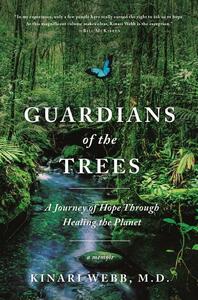Take a photo of a barcode or cover
Both a memoir and a call to action, Guardians of the Trees recounts Webb’s time in Indonesia, first on research, and then founding a non-profit called @healthinharmonyngo . People living near the rainforests had to log to pay for expensive medical bills; even if they realized the rainforest’s importance and that it wouldn’t last forever, they often had no choice. Webb already strongly believed in protecting the rainforests, but seeing the logging and medical crises in Indonesia is what inspired her to start Health and Harmony, providing medical services and other services to rainforest communities to combat both climate change and poverty. In her mind, human and planetary health are inextricably linked.
~
I guess this is more like info on the organization than a true review, but I found HIH’s model so fascinating and want to see more organizations functioning like it. I don’t think I’ve highlighted/annotated a nonfiction book more than GOOT. The beautiful relationships in the rainforest communities and with nature itself really shine in this memoir. I rarely felt like I needed to “take a break” from Guardians of the Trees, either. My only qualm is that the spiritual aspect Webb’s life wasn’t as clear or fleshed out to me, despite it seemingly playing a big part in expanding her work to a more global scale and in her personal healing, too.
~
However, the spiritual aspect made me think of how the church could use a similar model more often. How can we as Christians both address spiritual and physical poverty/societal issues, with long-term impacts? To me, those aspects are as closely linked as planetary and personal health are to Webb. After all, the early church provided for the poor, widowed, orphaned, and suffering, and the biblical God is a God of justice and love. I would definitely say that GOOT had a big impact on my awareness and thinking. I haven’t had a ton of 5
~
I guess this is more like info on the organization than a true review, but I found HIH’s model so fascinating and want to see more organizations functioning like it. I don’t think I’ve highlighted/annotated a nonfiction book more than GOOT. The beautiful relationships in the rainforest communities and with nature itself really shine in this memoir. I rarely felt like I needed to “take a break” from Guardians of the Trees, either. My only qualm is that the spiritual aspect Webb’s life wasn’t as clear or fleshed out to me, despite it seemingly playing a big part in expanding her work to a more global scale and in her personal healing, too.
~
However, the spiritual aspect made me think of how the church could use a similar model more often. How can we as Christians both address spiritual and physical poverty/societal issues, with long-term impacts? To me, those aspects are as closely linked as planetary and personal health are to Webb. After all, the early church provided for the poor, widowed, orphaned, and suffering, and the biblical God is a God of justice and love. I would definitely say that GOOT had a big impact on my awareness and thinking. I haven’t had a ton of 5
hopeful
informative
inspiring
medium-paced
adventurous
challenging
emotional
hopeful
informative
inspiring
reflective
medium-paced
I loved a lot of things about this book, but I really hoped there were more about the Indonesian people’s life and more about their struggles instead of only focusing on their needs and poverty. Still I loved how’s Dr. Kinari wrote about her connection to the forest and how in her healing journey she was able to heal the earth and so many lives with it.
adventurous
emotional
informative
inspiring
reflective
medium-paced
A hopeful story about the environment with a real global view, and some good analysis of issues within humanitarian aid etc
Interesting memoir. Though the author tends to the dramatic a bit much for my taste, it mostly works for her.
adventurous
emotional
inspiring
reflective
medium-paced
informative
inspiring
reflective
medium-paced
What a fascinating read! Kinari Webb's memoir is an engaging insight into how climate change and healthcare are interconnected. I have never really thought about this link before, but now that I've read Guardians of the Trees it seems so obvious. Of course, the welfare of people living near the world's largest forests impacts the forest as well! We as humans are not disconnected from nature, but one with it, and exploring such made for an inspiring and insightful read.
Webb also explored how colonisation and racism were connected to as well as caused climate change. After reading Climate Change is Racist by Jeremy Williams earlier this year, I already understood this, but looking at this case study in such a detailed fashion expanded my understanding thoroughly, by providing concrete examples and evidence. I think that going forward in solving the climate crisis it's vital to understand these links so I deeply appreciated how Webb included this.
One part I found slightly disappointing was Webb's refusal to mention capitalism and how that has impacted climate change. She implied it, and how the system of capitalism drives the people of Indonesia to log their forests, but she never actually said it, and I wonder if even she consciously knows it. At the end of the day, Kinari Webb is still an American, who, like many others who live in the U.S., may blindly accept capitalism as the default. Maybe I'm being presumptuous and if I am, I apologise. However, whether or not Webb realises that capitalism is a major factor - or even the root - of climate change, it still would have been beneficial to mention such in her book. Doing so would provide an even more holistic view of climate change, which is in turn important in tackling the climate crisis. Overall, this absence felt like such an obvious gaping hole in her otherwise intersectional memoir, so it was such a shame for her not to mention capitalism and class.
Another smaller aspect that I didn't enjoy was Webb's spiritual journey and how she came to Indonesia and started the clinic because she felt it was her calling. Personally, I found this quite preachy and irrelevant to the broader narrative. I could also have done without such detailed descriptions of her dreams. This felt quite out of place for a book that otherwise heavily relied on science and statistics. However, as this is not a scientific book, but rather a memoir, I'll (mostly) let this slide. Let and let live and all that.
Yet despite these misgivings, overall I found this book very hopeful. Understanding on a more holistic level the causes of climate change mean we can better combat it, so of course, I felt more hopeful. I would definitely recommend this book as a vital part of understanding the climate crisis as well as a way to mitigate one's own fears of climate change.
Webb also explored how colonisation and racism were connected to as well as caused climate change. After reading Climate Change is Racist by Jeremy Williams earlier this year, I already understood this, but looking at this case study in such a detailed fashion expanded my understanding thoroughly, by providing concrete examples and evidence. I think that going forward in solving the climate crisis it's vital to understand these links so I deeply appreciated how Webb included this.
One part I found slightly disappointing was Webb's refusal to mention capitalism and how that has impacted climate change. She implied it, and how the system of capitalism drives the people of Indonesia to log their forests, but she never actually said it, and I wonder if even she consciously knows it. At the end of the day, Kinari Webb is still an American, who, like many others who live in the U.S., may blindly accept capitalism as the default. Maybe I'm being presumptuous and if I am, I apologise. However, whether or not Webb realises that capitalism is a major factor - or even the root - of climate change, it still would have been beneficial to mention such in her book. Doing so would provide an even more holistic view of climate change, which is in turn important in tackling the climate crisis. Overall, this absence felt like such an obvious gaping hole in her otherwise intersectional memoir, so it was such a shame for her not to mention capitalism and class.
Another smaller aspect that I didn't enjoy was Webb's spiritual journey and how she came to Indonesia and started the clinic because she felt it was her calling. Personally, I found this quite preachy and irrelevant to the broader narrative. I could also have done without such detailed descriptions of her dreams. This felt quite out of place for a book that otherwise heavily relied on science and statistics. However, as this is not a scientific book, but rather a memoir, I'll (mostly) let this slide. Let and let live and all that.
Yet despite these misgivings, overall I found this book very hopeful. Understanding on a more holistic level the causes of climate change mean we can better combat it, so of course, I felt more hopeful. I would definitely recommend this book as a vital part of understanding the climate crisis as well as a way to mitigate one's own fears of climate change.
Guardians of the Trees filled the spaces that were left empty when I read The Overstory by Richard Powers earlier this year. I did not care for The Overstory, but Guardians of the Trees is exactly what I want when it comes to memoirs about conservation: heartfelt, personal, and comes with a strong message.
Sometimes I struggle with memoirs when they bounce back and forth in time, but Kinari Webb was fairly linear in her writing and especially engaging. Though it makes sense that healthcare and conservation are both important, Webb backs it up with the statistics through her work.
My biggest issue with the book was that it included a bigger religious aspect than I expected. I am not favorable to reading about religion or religious experiences, but, luckily, Webb did not lean too hard into this. For those who do enjoy reading about religious experiences, I do think they would enjoy learning about Webb's path to realization. It's just not for me.
I really appreciated that additional information was included in the afterword, both to explain that Webb left certain aspects of her story in the book to show path to continuous learning and where readers can learn more about her work.
Suehyla El-Attar is an excellent narrator and is quickly becoming one of my favorites (she also narrates P. Djèlí Clark's Dead Djinn Universe, which I highly recommend). She has an intimate quality to her voice that lends itself perfectly to this memoir.
Thank you to NetGalley and Macmillan Audio for allowing me to listen to this audiobook in exchange for an honest, unbiased opinion.
Sometimes I struggle with memoirs when they bounce back and forth in time, but Kinari Webb was fairly linear in her writing and especially engaging. Though it makes sense that healthcare and conservation are both important, Webb backs it up with the statistics through her work.
My biggest issue with the book was that it included a bigger religious aspect than I expected. I am not favorable to reading about religion or religious experiences, but, luckily, Webb did not lean too hard into this. For those who do enjoy reading about religious experiences, I do think they would enjoy learning about Webb's path to realization. It's just not for me.
I really appreciated that additional information was included in the afterword, both to explain that Webb left certain aspects of her story in the book to show path to continuous learning and where readers can learn more about her work.
Suehyla El-Attar is an excellent narrator and is quickly becoming one of my favorites (she also narrates P. Djèlí Clark's Dead Djinn Universe, which I highly recommend). She has an intimate quality to her voice that lends itself perfectly to this memoir.
Thank you to NetGalley and Macmillan Audio for allowing me to listen to this audiobook in exchange for an honest, unbiased opinion.



